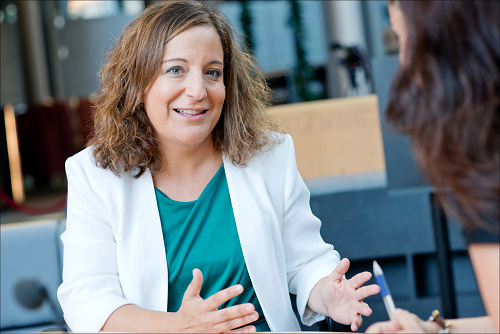Iratxe García Pérez: "It would be unacceptable to be unable to move forward on maternity leave"
The Parliament voted in October 2010 to extend maternity leave to at least 20 fully-paid weeks, but four years later this is still being blocked by governments in the EU Council. The European Commission now wants to withdraw the proposal. Ahead of a debate on this announcement in plenary, we discussed the issue with Iratxe García Pérez, a Spanish member of the S&D group who is the new chair of the EP's gender equality committee

Iratxe García Pérez
Why has this draft legislation not become EU law yet?
Parliament voted on it, but there is no common position from the Council. Some countries were blocking the issue mainly because there were either against extending the number of weeks or against the fact that these weeks were fully paid. Unless the Council adopts a common position, the issue cannot go further.
Given that the EU Council still does not agree on the subject, the Commission has decided to withdraw this draft directive. What will be the next steps?
We will see this afternoon what the Commission and the Council have to say. It seems that the Italian presidency could be interested in moving the issue forward. I really hope so. Once the member states start a debate and come to a common position, we can start negotiations. If this does not happen, then we will have no number of weeks, no rule on how these weeks should be paid… Nothing at all.
We will try this afternoon to avoid the second scenario. I think it would be unacceptable that for such an important directive, the Council would be unable to move forward.
Women’s rights activists have raised concerns about this issue. As the new chair of the women's rights and gender equality committee, do you think that we are still far from women's rights being fully respected?
Unfortunately, equality between men and women is still far from being a reality. On top of that, the economic crisis has significantly affected the situation of vulnerable groups such as women.
We still have a lot to do on European policies against gender violence, equal pay between men and women for equal work, professional and family life balance, the participation of women in the economic life and on corprorate boards, sexual health and reproductive rights, women with special needs and coming from ethnics minorities and, last but not least, the adequate representation of women in the new European Commission.
This Parliament will not accept a Commission where women are not adequately represented, quantitatively and qualitatively. Women represent 52% of society and have to be duly represented . Womens' rights should be taken into account in every policy we approve.
Source: European Parliament
- 421 reads
Human Rights
Fostering a More Humane World: The 28th Eurasian Economic Summi

Conscience, Hope, and Action: Keys to Global Peace and Sustainability

Ringing FOWPAL’s Peace Bell for the World:Nobel Peace Prize Laureates’ Visions and Actions

Protecting the World’s Cultural Diversity for a Sustainable Future

Puppet Show I International Friendship Day 2020

